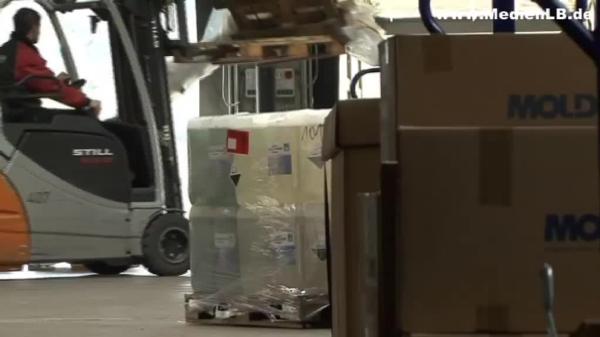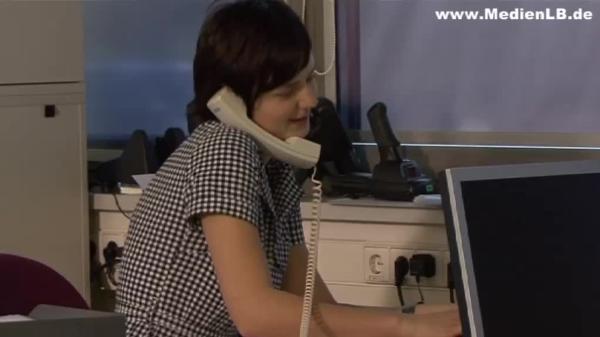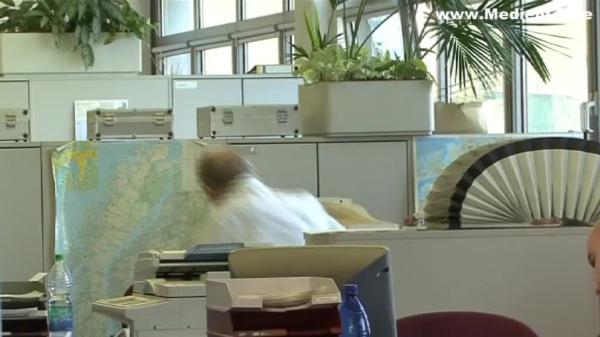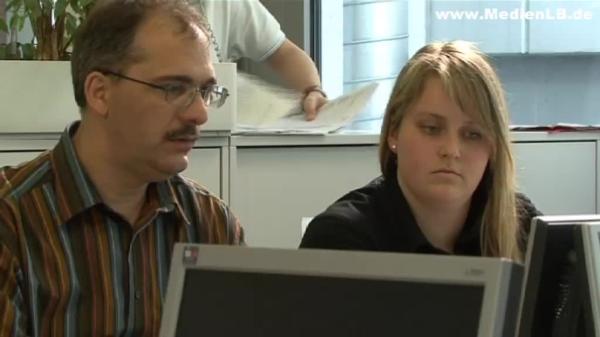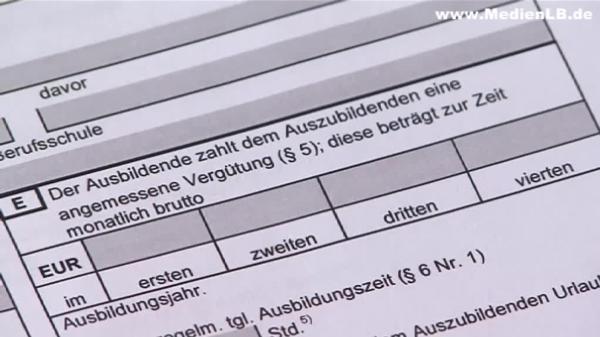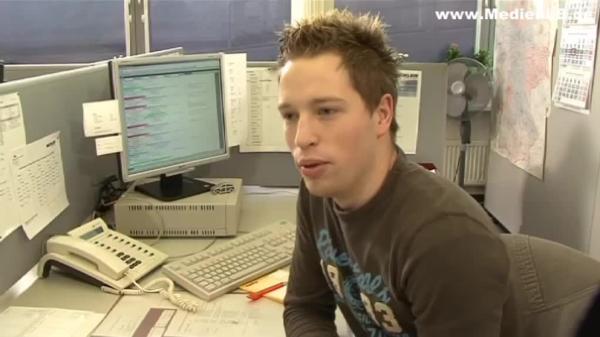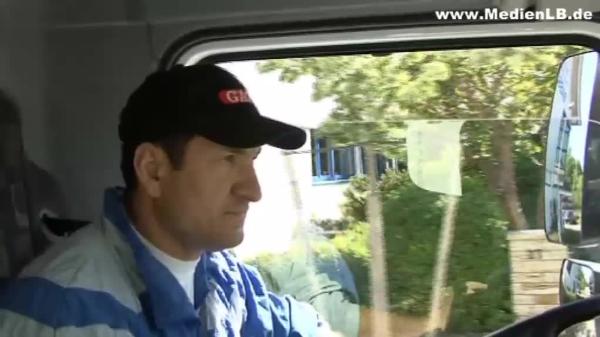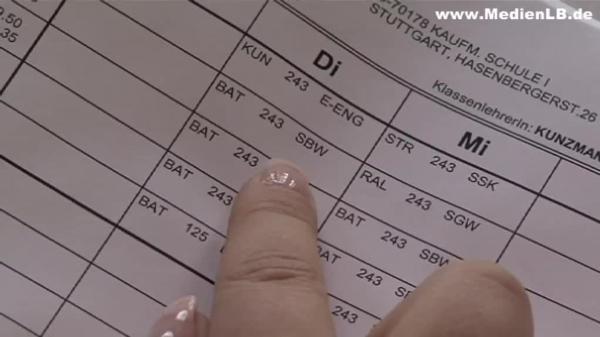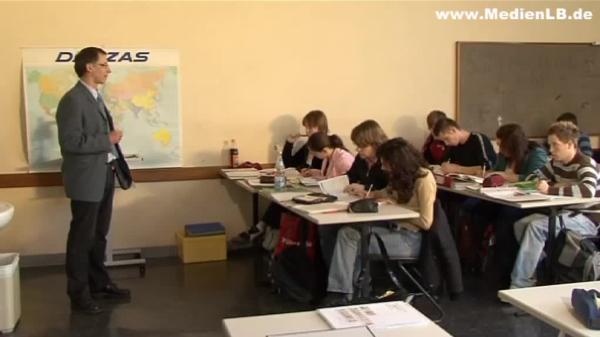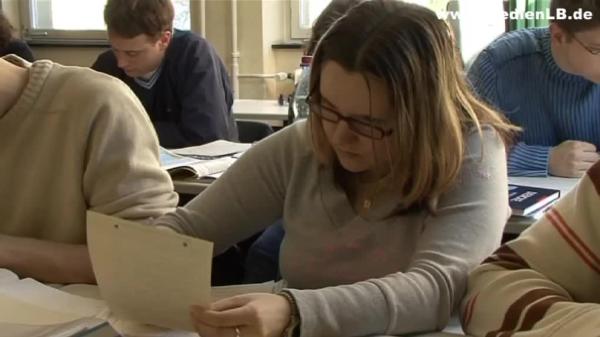Speditionskaufmann/-frau Logistik
Berufschancen heute

Freight forwarding and logistics service clerk

1. The search Alexander: “And...how was it?” Meral: “Going to the job center was an interesting experience. The career adviser proposed a career training in the forwarding business. She pointed out that it would be an economically stable and varied job with good aspects for the future. Meral: “And then she called an company named “Wackler” and made an appointment with them.” Alexander: “Ok.” Meral: “I could start tomorrow and even bring someone along. How about you… - oh, and take Helen with you.” Meral: “What kind of careers could we pursue here?” Mrs. Mrs. Schwarz: “You have a nuber of opportunities: one, get some training in the commercial area of the business, and become a qualified merchant trader. Secondly, specialist for warehouse logistics and a qualified warehouse clerk. The first career is subject to a two-year-training, the last two require three years of training.” Alexander: “What opportunities are available in this business after completing training.” Mrs. Mrs. Schwarz: “There are a couple of options: the two preferred choices are gaining a bachelor’s degree either in business administration or in transportation systems. Both last for two to three years and it is up to you whether to commit yourself fulltime or during service.” Helen: “What requirements have to be met in order to go into commerce?” Mrs. Mrs. Schwarz. “A very good extended elementary school diploma is expected. It would be even better to hold a Junior High School or Commercial School diploma.” Mrs. Mrs. Schwarz: “What type of school did you attend?” Meral: “First I went to extended elementary school. After that, I made up my Junior High School Diploma within a year followed by graduating from an economically oriented High School.” Mrs. Mrs. Schwarz: “What were your favourite classes?” Meral: “I liked my business classes, because I had never had any of those before. I also liked my English and Spanish class.” Mrs. Schwarz: “What about you? What type of education did you have?” Helen: “I graduated from High School directly. I favoured the German class along with my foreign language classes. I took the opportunity to study three languages: German, French, and Spanish. That was a lot of fun.” Mrs. Schwarz: “What are your strengths?” Alexander: “I am very open minded, I don’t have any problems connecting with new people. I am able to get my work independently as an individual.” Helen: “Do you offer internships to students so that they can get a glimpse of what the job might look like?” Mrs. Schwarz: “Of course…any time. You only have to send in an application along with your résumé telling us the time frame in which you’re considering in doing an internship. You are welcome to become an intern for 3 to 5 days during a school semester or during break. We comply with your wishes.” 2. First Steps 2.1 The business Mr. Scheifele: “Wackler is a middle-class forwarding and logistics company representing more than 150 years business history. We are a supplier, so we manage the entire flow of goods starting with the acquisition up to the customer. With period of globalisation, this business has become one of the big players in the economy. We keep the world’s goods in motion, so no assembly line has to shut down and shelves at the supermarket are guaranteed to be filled. We ensure that goods arrive on time, at reasonable prices, and are in the right place at the right time in requested quality, worldwide. Our qualified and exceptionally motivated employees are our most valuable asset. They find themselves in a steady process of being promoted and additionally educated, while attending intensive courses. This business is subject to a constant adaptation process, meaning that studying throughout your entire career is one major tool to be successful.” 2.2 Requirements Mr. Scheifele: “Computers from Asia, mechanical parts from Spain, Tires from France, factory plants to China, Fruit from Turkey. This is only a small example of the variety of goods we dispatch daily around the world. We are carrying a great deal of responsibility while establishing a stable functioning transport System. Therefore we need people who keep a clear head in critical situations.” Mrs. Schwarz: “Requirements to become a businessman is to have an outstanding extended elementary school diploma, displaying a GPA similar to the grade “B”. Better yet would be a Junior High School diploma. We put emphasis on the following classes. First of all, a completed German class is essential, because it is very important to us that you articulate. Because we communicate with our customers a lot. Another subject would be mathematics. In addition to that, being able to hold a conversation in a foreign language is important too, because we do business internationally. Our young trainees should also have knowledge about Geography, knowing about the local area and be familiar with important places in the world. At last, we emphasize the following soft skills: being communicative and open minded. Most of the time we keep the contact to our customers via phone. Another important factor is being able to work in a team. On the one hand young people work in teams, but on the other they also have to be capable of working alone. 2.3 What do I learn as a trainee? Forwarding and logistic agents manage the shipping, handling, and storage of goods. Our businessmen take time to introduce trainees to their tasks. From time to time, our trainees return to the company, so that they are exposed to the office work, that has to be dealt with. Maier: “We are here at the control centre. Like the name indicates: the entire facility is operated from this place. The handling for example: One important thing is that arriving vehicles report to the information point.” F: “Good morning. I’m bringing Wackler 353.” L: ”What type of vehicle are you driving?” F: “LW-2222- short No. 1801.” L: “1801 – ok, please proceed to gate 96.” F: “Alright – I’ll send in the papers.” Leaving the control centre we get to another important location: the warehouse, where goods are handled day and night. Maier: “This is the incoming goods department. Here all the barcodes from all packages and parcels are scanned, which is the receiving inspection routine. The goods are then sorted out and reach the sub-surface conveyor. This is the loading department. The goods reach the loading robot. Once the package is taken off the conveyor, it is placed in the right position to be scanned once more and properly loaded.” 2.4 Rights and obligations Mrs. Schwarz: “Usually training lasts 3 years meaning 36 months. Trainees are subject to 4 months of probation according to the Industrial Training Act. Wages depend on the respective collective wage agreement administered by stated. Wages, however, rise from the 1st to the 3rd year of training. Our working hours are 7.6 hours a day. Vacation is also subject to tariffs. Pursuing a dual-based training means you appear in the job itself and have to attend school. School lasts 1.5 days a week. The alternative is a block schedule, meaning that trainees have an alternating education. They go to school one week and go to work the other. Part of our training while students are in for work is a communications’ training, which is completed during the first year. This way, young people learn to immerse their skills on the phone. Of course, there are many opportunities to continue training and attend extended studies classes. For example you can earn a degree in business administration, transport management and operations, or in logistics.” 3. Vocational training 3.1 Every day training routine Tristan Müller: “Hello, forwarding agency “Wackler”, Tristan Müller speaking. Please, hold the line. Do you have your tracking number? DLC Kornwestheim – that would be the service department – I would like to connect you to Mrs. Hofmann. One moment, please. My name is Tristan Müller. This is my 2nd year of training with “Wackler”. Right now, I am working at the call centre. My task here is to answer in coming calls and help Customers as much as possible.” Anne Renz: “My name is Anne Renz. This is my 2nd year of training with the forward agency “Wackler” in Göppingen. Currently, I work in the local traffic department. The transport routes are planned here and my job is to print the maps for the trucks. This is the truck-short-number. This is the map that has already been planned. Two deliveries are indicated on this map, right now. I like this job, because it is eventful, you are in contact with customers, even though only over the phone, and you are in a position where you are able to organize.” Tristan Müller: “One moment, please – I would like to connect you to Mr. Heidle. You’re welcome. The ZEPRA II program is fantastic. With this program we can pin point the exact location of the delivery. You only have to determine, whether you are the sender or the receiver. Then you enter a tracking number, specifically addressed to you, and then you can track, where the parcel has been scanned – here you see, that is has been reloaded to one of our partner agencies. Looking at the receipt, the receiver endorses, that the parcel has been received properly and signs it.” 3.2 Working independently Right now, Anna learns how to get in contact with a driver using the scanner, in order to assign an additional delivery. Ortwein: “The additional task is clicked and dragged over here, released and the message pops up on the scanner, accompanied by an acoustic signal. This indicates to the driver, that his scanner has been contacted and received a new order. Now he has to push the “Accept” button to confirm. By using the program we are able to see, that the driver accepted the order: 915 accepted.” Anne Renz: “Our training officer, Mrs. Mrs. Schwarz, proposed a reduction of training time, so that I’m able to graduate after two and a half years of training instead of three. I’m going to take this chance.” Tristan Müller: “I have an order from one of our customers. He is making an appointment, meaning that he intends for the parcel to be delivered on the 16th, on the 19th at the latest. I’m entering the sender’s name, and here goes the receiver’s name in 9…Weiden. Now I’m only declaring the number of pallets. This is a disposable pallet, an EW, due on the 16th. Forwarding agency Wackler, Tristan Müller speaking – please hold the line.” 4. School education 4.1 Every day routine at school At the “Kaufmännische Schule I” in Stuttgart, students attend school 1.5 days a week. There are also schools that prefer to execute a block schedule. Anne Renz: “This class is called business administration.” In addition to the general subjects as German and Social Studies, business administration is a major subject, divided into different classes. Important chapters are the following: Closing a contract Processing payments Comparing carriers Processing fright orders Handling of import and export orders Management of acquisition and storage Teacher: “In case we must search for the “general terms and conditions form” in the future, we only have to take a look at the “text of law” and there we find the “VBGL...” Student: “…the receiver or the sender checks with the receiver: yes, the driver unloads if he gets a bonus on delivery in return – I think, there is room for everything.” Teacher: “That’s how it is supposed to be!” Anne Renz: “I like my business administration class best. Reason being, is that I learn about the rights and obligations of my company and I get to know the basics, that contracts depend on for example.” Tristan Müller: “I suppose the traffic geography class is kind of important, because working for a forwarding agency you are exposed to the European if not even the global market. It is a major tool to know about cities and highways. Especially being familiar with how highways operate is very important.” Anne Renz: “I absolutely don’t like traffic geography, to be honest with you. The reason for that is that you have to remember cities, better yet you have to remember the entire world with its cities and names and so on, and my head just blocks.” Teacher: “I have already marked a few points on this map of Germany. You will have to label those points at first. Believe me, these are cities of the Federal Republic of Germany. Afterwards we will draw the highway network together, you will receive a description for that also.” Another important field of study of the theoretical education is called traffic geography. Students learn about the European road and inland navigation network by exercising concrete problems. Later ports, shipping routes, and international airports are added. In class students solve problems by using maps and atlases. During the exams, though, any kind of help is prohibited, so they have to know everything by heart. 4.2 Exams In the midst of the second year of training students have to take their mid terms. Participants have to solve problems related to every day practice. Areas of testing: Industrial performance declaration Accounting Economics and Social Studies Finals are extensive and quite complex. It consists of two parts: in the general section of the exam students are tested mainly in Forwarding and Logistics, but Marketing and Human Resources Management are also included. The second part concentrates on the ways of transportation and contains specifically designed problems regarding that topic. The student may choose two out of all options as ways of transportation, which could be road, railway, air transportation, inland navigation transportation or maritime shipping. He will be informed in advance, which of these topics will be relevant to him, and the student will have to prepare specifically for that particular topic assigned to him or her. Undergoing training to become a forwarding and logistics agent leads eventually to being employed in the forwarding business. If the economy is doing well, the forwarding agent is doing well also, because goods have to be handled. Foreign trade has always been a major factor for economic growth in Germany, so it is strongly recommended to pursue such a training. Alexander: “Aren’t you undergoing training here?” Tristan: “Yes, that’s right.” Meral: “Do you like it?” Tritan: “The training is incredible.” Alexander: “What do you do?” Tristan: “I’m in the office most of the time – working on the computer – I have to make a lot of phone calls.” Meral: “How do you get along with your supervisor?” Tristan: “In every department I have a different supervisor. Up until now every one has been great.” Alexander: “Is there anything that annoys you?” Tristan: “Not really – occasionally it gets a little hectic around here, but you get used to it.” Meral: “What classes do you have in school?” Tristan: “Predominantly, business administration, but we also have a traffic geography class and an English class.”



